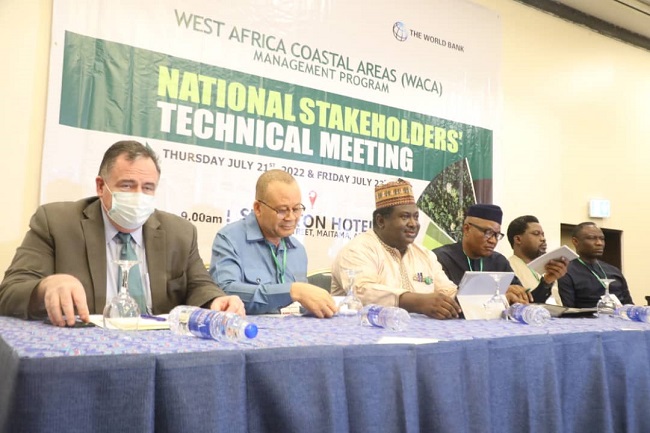The Federal Government of Nigeria and World Bank have reiterated commitment to implement the West Africa Coastal Areas (WACA) Management Programme, to improve livelihoods of coastal communities in the country.

The Minister of Environment, Mr Muhammed Abdulahi, made the commitment at a two-day National Stakeholders’ Technical Committee Meeting on WACA programme in Abuja on Thursday, July 21, 2022.
Abdulahi, represented by the Director, Environmental Impact Assessment in the ministry, Mr Abbas Suileman, said the effort would reduce the vulnerability of coastal areas.
According to him, the programme will also promote climate-resilient integrated coastal management, within the framework of sustainable environmental management.
“The benefits of the WACA are quite immense; the WACA will help Nigeria obtain financing and expertise to sustainably manage her coastal areas, enhance industrial competitiveness, market access, innovation and investment promotion.
“It will also promote productive employment for rural communities and entrepreneurship development, sustainable energy and environmental management.
“The Federal Government is desirous of witnessing verifiable milestone achievements to showcase under the implementation of the WACA,’’ he said.
The minister said the implementation of the programme was delayed due to some technical issues, including funds for technical studies which were prerequisites for Multi-Sectoral Investment and outbreak of COVID-19 pandemic.
He said that the World Bank had secured a grant for the technical studies in Lagos, Delta and Cross River states.
“In view of this, I am convinced that the World Bank in Nigeria will continue to bring to fore their wealth of experience and understanding in achieving results within the shortest possible time,’’ he said.
Abdulahi urged stakeholders, the World Bank and its partners to redouble their efforts at developing the coastal landscape now that WACA had been implemented in other West African countries.
According to him, the critical stakeholders should carry out their official responsibilities with utmost diligence and uprightness.
“Let me also reiterate that your appointment to the National Stakeholders Technical Committee on WACA is indeed a call to service.
“It is also a representation of your various state governments, Ministries, Departments and Agencies (MDAs) and the minimum expected from you is a service of honesty, integrity and foresightedness,’’ he said.
The Permanent Secretary of the ministry, Mr Hassan Musa, said WACA was established in 2015 by World Bank to manage growing coastal erosion and flooding problems in West Africa region.
Musa said that WACA established a committee in 2016 to ensure that the programme covered a range of sectoral issues.
The Permanent Secretary was represented by Mr Dilichukwu Etigbue, Director, Erosion, Flood and Coastal Zone Management in the ministry.
Mr Francesso Mentovani, Engagement Leader and Lead Water Specialist, Sustainable Development, World Bank said that all countries in West Africa, including Nigeria were committed to the implementation of the programme.
Mentovani said that the stakeholders’ meeting was convened to get the buy-in of all stakeholders on the way forward for WACA in Nigeria.
He said that the objective of the programme was to preserve, protect and tackle environmental issues such as desertification, climate change and other environmental challenges in the region.
The Lagos State Commissioner for Environment and Water Resources, Mr Tunji Bello, represented by Mr Adegbite Mohammed, said that the state had invested much fund in the programme.
Bello said the state had over 100km of coastal lands, adding that it was committed to creating seawall, thereby protecting promenades, roads and houses in the area.
He urged the stakeholders to intensify efforts for effective implementation of the programme.
According to him, “I will suggest that all the coastal states management should create a strong team to share their problems to make the implementation of the programme easier”.
By Vivian Emoni
